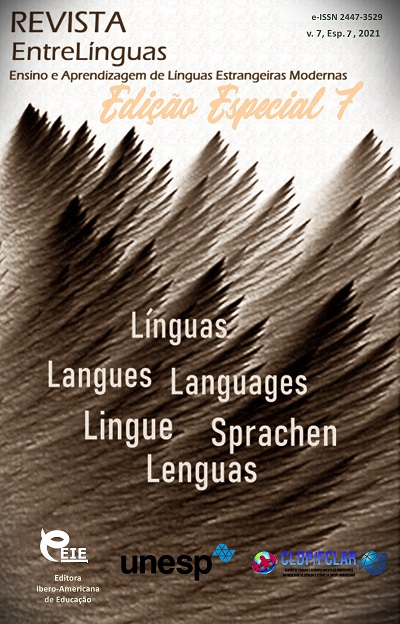Quadro “estado emocional nas atividades sociais”: formação e específicas de sua representação a nível de linguagem
DOI:
https://doi.org/10.29051/el.v7iesp.7.16294Palavras-chave:
Verbo, Emoção, Conceituação, SemânticaResumo
A pesquisa proposta é devotada aos verbos do estado emocional (agonizar, lamentar, reclamar, desejar, deplorar, desesperar, dúvida, exultar, medo, inquietar-se, lamentar, lamentar, definhar, prolongar, maravilhar-se, lamentar, lamentar, pânico , ofegar, lamentar, alegrar-se, arrepender-se, revoltar-se, ficar de pé, sofrer, amuar, etc.). Sua especificidade está associada ao mundo interior do sujeito, com sua percepção pessoal e conceituação de eventos ambientais. Essa compreensão subjetiva do que está acontecendo determina a presença de uma estrutura semântica complexa dos verbos em estudo.
Downloads
Referências
BOGUSLAVSKIJ, I. M., ZALIZNJAK, ANNA, A. Research on the semantics of predicates of the internal state”, Voprosy jazykoznanija, Moscow, Russia, no. 1, pp. 164-168. 1995.
CROFT, W. Syntactic categories and grammatical relations: The Cognitive organisation of information, Chicago, London, UK. 1991.
DEM’YANKOV, V. Z. “Сognitive linguistics as a kind of an interpretive approach”, Voprosy jazykoznanija, Moscow, Russia, no. 4, pp. 13-17. 1994.
FILLMORE, C. J. “On the organization of semantic information in the dictionary”, Novoe v zarubezhnoj lingvistike [New in foreign linguistics], Nauka, Moscow, Russia, pp. 23-60. 1983.
HORNBY, A.S. Oxford Advanced Learner’s Dictionary of Current English, Oxford University Press, Oxford, UK. 1982.
JACKENDOFF, R. Semantic Structures. – Patterns in the minds. Language and human nature, Harvester Wheatsheaf, New York, US. 1994.
LAMB, S.M. Pathways of the Brain: The Neurocognitive Basis of Language, (Current Issues in Linguistic Theory, 170.), Amsterdam and Philadelphia: John Benjamins, Netherlands-US. 1999.
MYERS, D.G. Social psychology (11th ed.), McGraw-Hill, Boston, MA, US. 2012.
PETRENKO, V.F. Osnovy Psihosemantiki [Basics of psychosemantics], Izdatel’stvo Moskovskogo universiteta, Moscow, Russia. 1997.
PETROVSKIJ, A.V. IAROSHEVSKII, M.G. Psihologija [General Psychology], Prosveshhenie, Moscow, Russia. 2009.
SHAHOVSKIJ, V.I. Lingvisticheskaya teoriya emocij [Linguistic theory of emotions], Izdatel’stvo VGPU, Volgograd, Russia. 2008.
UFIMTSEVA, A.A. Leksicheskoye znacheniye [Lexical meaning], Nauka, Moscow, Russia. 1986.
Downloads
Publicado
Como Citar
Edição
Seção
Licença

Este trabalho está licenciado sob uma licença Creative Commons Attribution-NonCommercial-ShareAlike 4.0 International License.
Os manuscritos aceitos e publicados são de propriedade da Revista EntreLínguas. Os artigos publicados e as referências citadas na Revista EntreLínguas são de inteira responsabilidade de seus autores.
Transferência de direitos autorais – autorização para publicação
Caso o artigo submetido seja aprovado para publicação, já fica acordado que o(s) autor(es) autoriza(m) a UNESP a reproduzi-lo e publicá-lo na EntreLínguas, entendendo-se os termos “reprodução” e “publicação” conforme definição respectivamente dos incisos VI e I do artigo 5° da Lei 9610/98. O artigo poderá ser acessado pela rede mundial de computadores (Internet), sendo permitidas, a título gratuito, a consulta e a reprodução de exemplar do artigo para uso próprio de quem a consulta, desde que haja a citação ao texto consultado. Essa autorização de publicação 328 EntreLínguas, Araraquara, v. 1, n .2, p. 323-328, jul./dez. 2015 não tem limitação de tempo, ficando a UNESP responsável pela manutenção da identificação do(s) autor(es) do artigo. Os artigos publicados e as referências citadas na Revista EntreLínguas são de inteira responsabilidade de seus autores.











